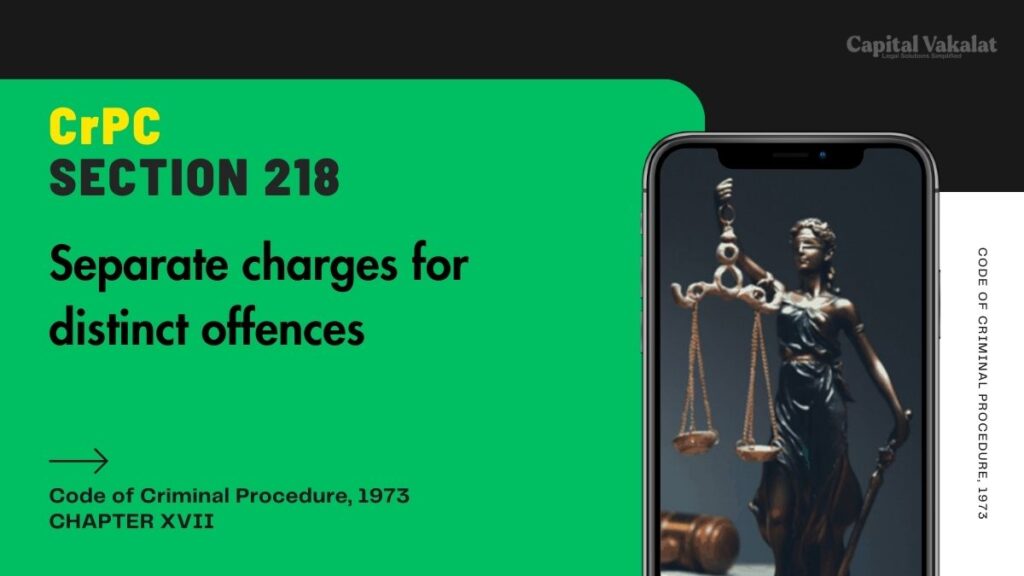The criminal justice system is a complex web of laws designed to ensure justice and maintain social order. One critical component within this framework is Section 218 of the Code of Criminal Procedure (CrPC) in India. This section mandates separate charges for distinct offences, ensuring that each charge is treated individually and fairly in a court of law.

By delving into the nuances of Section 218 CrPC, we can better appreciate its significance in safeguarding the rights of the accused and upholding the principles of justice.
Bare Act. Section 218 Cr.P.C.
Separate charges for distinct offences.
(1) For every distinct offence of which any person is accused there shall be a separate charge, and every such charge shall be tried separately:
Provided that where the accused person, by an application in writing, so desires and the Magistrate is of opinion that such person is not likely to be prejudiced thereby, the Magistrate may try together all or any number of the charges framed against such person.
(2) Nothing in sub-section (1) shall affect the operation of the provisions of sections 219, 220, 221 and 223.
Illustration
A is accused of a theft on one occasion, and of causing grievous hurt on another occasion. A must be separately charged and separately tried for the theft and causing grievous hurt.
The Foundation: Section 218 CrPC
Section 218 CrPC states that for each distinct offence, a separate charge should be framed. This provision is fundamental in ensuring that the accused understands the specific allegations against them and is not overwhelmed by multiple charges lumped together, which could complicate their defense.
Historical Context and Evolution
The concept of separate charges for distinct offences has evolved over centuries. Historically, legal systems worldwide have grappled with the challenge of ensuring fair trials. The framers of the Indian CrPC recognized the potential for injustice if multiple charges were combined indiscriminately, leading to the establishment of Section 218.
Importance of Separate Charges
Ensuring Clarity and Fairness: When charges are separated, it provides clarity to both the prosecution and the defense. Each charge can be examined on its merits without the confusion of overlapping evidence and arguments.
Preventing Prejudice: Combining multiple charges can prejudice the court against the accused. By separating charges, the court can objectively assess each allegation, ensuring a fair trial.
Facilitating Defense: The accused has the right to know the precise nature of the charges against them. Separate charges allow the defense to prepare adequately for each specific offence.
Exceptions to the Rule
While Section 218 mandates separate charges, there are exceptions under specific circumstances. For instance, Section 219 allows for the trial of three offences of the same kind committed within a year to be combined in a single charge. Similarly, Sections 220 and 221 provide for exceptions where the offences are interconnected or form part of a series of acts constituting the same transaction.
Challenges and Criticisms
Despite its importance, Section 218 CrPC is not without its challenges. Critics argue that it can lead to lengthy trials and procedural delays. In complex cases involving numerous offences, separating charges can result in fragmented trials, potentially overwhelming the judicial system.
Judicial Interpretations and Case Laws
The judiciary has played a crucial role in interpreting Section 218. Various landmark cases have shaped its application and scope. For example, in State of Maharashtra vs. Suresh, the Supreme Court emphasized the necessity of separate charges for distinct offences to prevent prejudice and ensure a fair trial.
Comparative Analysis: Global Perspectives
Examining how other legal systems handle multiple charges offers valuable insights. For instance, the United States follows a similar principle, where each offence must be charged separately. However, the procedures and exceptions differ, reflecting the unique legal traditions of each country.
Practical Implications for Legal Practitioners
For legal practitioners, understanding Section 218 CrPC is crucial in formulating effective defense strategies. It requires meticulous attention to detail in ensuring that each charge is addressed individually, and any potential prejudice is mitigated.
Conclusion
Section 218 CrPC is a cornerstone of the Indian criminal justice system, ensuring that each distinct offence is treated with the seriousness it deserves. By mandating separate charges, it upholds the principles of clarity, fairness, and justice, protecting the rights of the accused while maintaining the integrity of the judicial process.